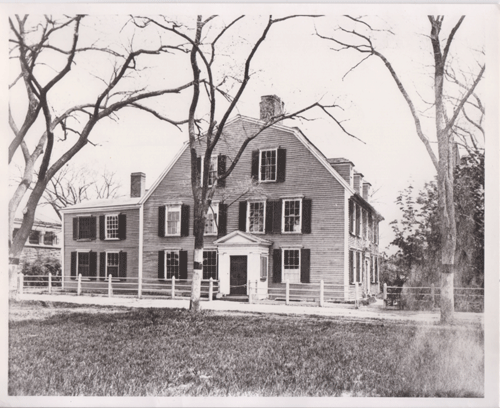“With respect to the liberation of our friends in Boston”
Last month I left off a discussion of Boston’s first town meetings during the war with the agreement that Bostonians reached with Gen. Thomas Gage.
In exchange for lodging all privately owned firearms with the selectmen, the military authorities promised to let people leave the besieged town with their other goods.
Henderson Inches, a merchant and former selectman who had helped to negotiate that pact, brought news of the general’s approval to the Patriot committee of safety on 28 April. That group, chaired by Dr. Joseph Warren, was headquartered in Jonathan Hastings’s house in Cambridge (shown above).
That committee answered to the Massachusetts Provincial Congress, which was out in the Watertown meetinghouse. Its president, John Hancock, was away at the Second Continental Congress, and other men were serving as president pro tempore. On 24 April that job had fallen on the Rev. John Murray (1742–1793) of Townsend/Boothbay, Maine, who had previously filled in as secretary.
The congress responded to the news out of Boston that afternoon with this resolve:
On 29 April, the committee of safety appointed a subcommittee to draft that recommendation. The delegates named were Azor Orne of Marblehead, Richard Devens of Charlestown, and Benjamin White of Brookline—men from two communities neighboring Boston and the province’s second-largest port. Their towns would be among the first to receive refugees.
However, the committee of safety was managing many martial and political efforts, such as reorganizing the militia companies that had turned out on 19 April into an army enlisted till the end of the year and propagating the Patriot version of the fighting so far. Those subcommittee members were handling other tasks. They didn’t produce a quick plan.
The provincial congress in Watertown got antsy. On the morning of 30 April that body sent delegate John Grout of Petersham to ask for the committee of safety’s result. Delegates also discussed “an addition to the committee of safety”—i.e., adding more members so as to spread out the work.
There was still no response from Cambridge after the midday dinner break. The congress then sent John Mosely of Westfield “to procure their result with respect to moving out the inhabitants of Boston” with a letter that demanded a response:
In exchange for lodging all privately owned firearms with the selectmen, the military authorities promised to let people leave the besieged town with their other goods.
Henderson Inches, a merchant and former selectman who had helped to negotiate that pact, brought news of the general’s approval to the Patriot committee of safety on 28 April. That group, chaired by Dr. Joseph Warren, was headquartered in Jonathan Hastings’s house in Cambridge (shown above).
That committee answered to the Massachusetts Provincial Congress, which was out in the Watertown meetinghouse. Its president, John Hancock, was away at the Second Continental Congress, and other men were serving as president pro tempore. On 24 April that job had fallen on the Rev. John Murray (1742–1793) of Townsend/Boothbay, Maine, who had previously filled in as secretary.
The congress responded to the news out of Boston that afternoon with this resolve:
Ordered, That the committee appointed to introduce the honorable delegates from the convention at Exeter, in New Hampshire, to the committee of safety, apply to said committee for an authentic account of what transactions have certainly taken place, with respect to the liberation of our friends in Boston, and report as soon as may be.The next morning, the committee reported they had delivered the message and “brought from the committee of safety a number of papers, which contain the proceedings of the town of Boston with general Gage, in respect to moving the inhabitants and their effects.” The committee asked that the larger legislature not take any action until they had come up with a recommendation.
On 29 April, the committee of safety appointed a subcommittee to draft that recommendation. The delegates named were Azor Orne of Marblehead, Richard Devens of Charlestown, and Benjamin White of Brookline—men from two communities neighboring Boston and the province’s second-largest port. Their towns would be among the first to receive refugees.
However, the committee of safety was managing many martial and political efforts, such as reorganizing the militia companies that had turned out on 19 April into an army enlisted till the end of the year and propagating the Patriot version of the fighting so far. Those subcommittee members were handling other tasks. They didn’t produce a quick plan.
The provincial congress in Watertown got antsy. On the morning of 30 April that body sent delegate John Grout of Petersham to ask for the committee of safety’s result. Delegates also discussed “an addition to the committee of safety”—i.e., adding more members so as to spread out the work.
There was still no response from Cambridge after the midday dinner break. The congress then sent John Mosely of Westfield “to procure their result with respect to moving out the inhabitants of Boston” with a letter that demanded a response:
IN PROVINCIAL CONGRESS, April 30, 1775.TOMORROW: Resolutions at last.
SIR— I am directed to inform you, that it is with regret, this Congress find themselves obliged to send to the committee of safety a third messenger, to request their immediate report on the subject of the removal of the poor inhabitants of Boston.
To wait for that report, the Congress have suspended all proceedings on that matter, and sat in almost impatient expectation, by several adjournments, since seven o’clock this morning. I am obliged to request your answer by this express, without loss of time, that the Congress may then see what it is their duty to conclude on.
I have the honor to be, with great respect, Sir,
Your most obedient humble servant,
JOHN MURRAY.


No comments:
Post a Comment